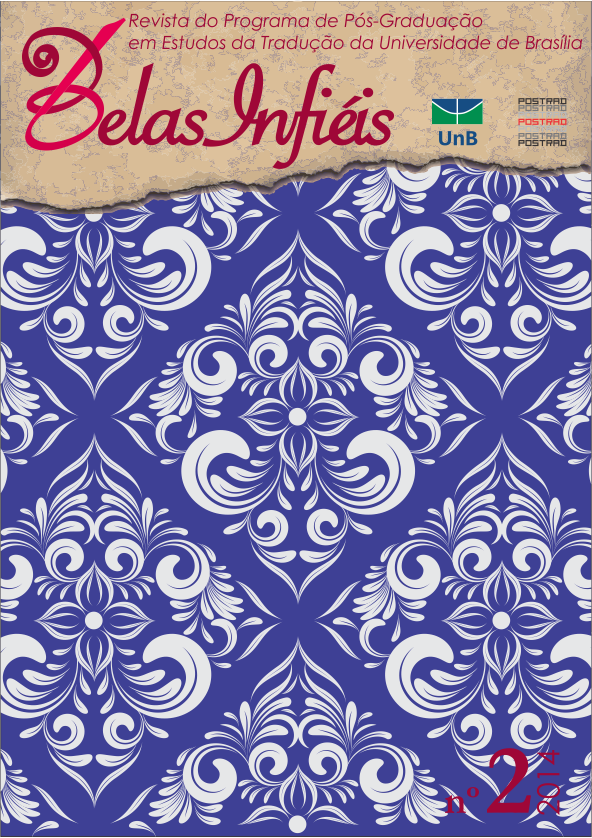TRADUÇÃO COMENTADA DO CONTO LE GÉNIE BONHOMME, DE CHARLES NODIER (1837)
DOI:
https://doi.org/10.26512/belasinfieis.v3.n2.2014.11293Palavras-chave:
Charles Nodier, Conto fantástico, Projeto tradutórioResumo
Sem a história das traduções não haveria história mundial. A importância de Nodier e a riqueza de sua obra, justificam sua tradução. Le Génie Bonhomme é um de seus contos, de 1837, foi publicado em várias obras, por exemplo, Contes Fantastiques, 1957. No caso, a importância desta tradução vem do fato de o próprio conto ser imperdível. Le Génie Bonhomme apresenta as características de seu gênero: é uma ficção em prosa simples, sua narrativa é reduzida aos personagens essenciais, caracterizada pela simplicidade e unidade temática (uma só situação, na qual, não há confusão entre o mal e o bem, o ócio que leva ao tédio e o trabalho que leva à felicidade), mas também, pela inventividade, presente na fantasia e no colorido da narrativa, nas características dos personagens e na escolha perspicaz de seus nomes. O projeto de tradução foi conservador, visando à manutenção do estilo original.
Downloads
Referências
CAMARANI, A.L.S.CharlesNodier: em busca do texto definitivo.In: Linguagem ”“Estudos e Pesquisas, Catalão, vol. 4-5 ”“2004.
__ _____________A Poética de Charles Nodier: contendo a tradução de A Fada dasMigalhas.São Paulo: Anablumme; Fapesp, 2006.
________________OsProblemas da Tradução Literária: La Fée aux Miettes de CharlesNodier, paper, 2009.
CODENHOTO, C.D. Na Senda das Noites: “Les quatre talismans” de Charles Nodier et Les milles et une nuits. 2007. Dissertação (Mestrado). Faculdade de Filosofia, Letras e Ciências Humanas da Universidade de São Paulo. São Paulo, 2007.
DEUS, D.R. La Recepciónde la Literatura Fantástica em La España del Siglo XIX. 2000. Tese (Doutorado). Programa de Teoria y Literatura Comparada. Departamento de Filologia Española. Universidad Autónoma de Barcelona. Barcelona, 2000.
Charles Nodier-Summary Bibliographywww.isfdb.org/cgi-bin/ea.cgi?16549 consultadoem01/10/2012literature:
FERNANDES, Lincoln P. Brazilian Prctices of Translating Names in Fantasy: A Corpus Based Study. Florianópolis: UFSC/CCE/DLLE , 2013.
KITTEL, H. e POLTERMANN, A. German Tradition. In: Baker, M. (ed) Routledge Encyclopedia of Translation Studies.London/New York:Routledge, 1998. P. 418-428.
MILTON, J. Tradução ”“Teoria e Prática. São Paulo: Martins Fontes, 2010.
NODIER, C. Smarra ou os demônios da noite. Tradução de Álvaro Guerra, Lisboa: Ed. Estampa, 1977.
_________ Le Bibliomane. Bibliothèque Municipale de Lisieux. Difusion libre et gratuite (freeware), 1996.
SCHLEIERMACHER, F. Sobre os diferentes Métodos de Tradução (1813). Trad. de Celso Braida. In: HEIDERMANN, W. (org). Clássicos da teoriada tradução. Antologia bilíngue. Vol. I, Alemão-Português. 2ª ed. Florianópolis:NUT, 2010, p. 38-101.
Shavit, Z. Poetics of Children’s Literature. Athens/London: The University of Georgia Press, 1986.
SOTO, P. C.; COSTA, W.C. Traduzindo Felisberto e seu idioleto fantástico. In: As Hortênsias. Trad. de Pablo Cordellino Soto e Walter Carlos Costa. São Paulo: Grua, 2012.
VENUTI, L.Invisibility. In:Translator’s invisibility: a history of translation. NewYork:Routledge, 1995. p.1-42.
__________A tradução e a formação de identidades culturais. In: SIGNORINI, Inês. (Org.)Língua(gem) e identidade: elementos para uma discussão no campo aplicado. Campinas: Mercadode Letras. 1998. p.173-198.
WYLER, L. Línguas, Poetas e Bacharéis ”“uma crônica da Tradução no Brasil. Rio de Janeiro: Rocco, 2003.
Downloads
Publicado
Como Citar
Edição
Seção
Licença
Dado ao acesso público desta revista, os textos são de uso gratuito, com obrigatoriedade de reconhecimento da autoria original e da publicação inicial nesta revista
A revista permitirá o uso dos trabalhos publicados para fins não comerciais, incluindo direito de enviar o trabalho para bases de dados de acesso público. As contribuições publicadas são de total e exclusiva responsabilidade dos autores.
Os autores, ao submeterem trabalhos para serem avaliados pela revista Belas Infiéis, mantêm os direitos autorais e concedem à revista o direito de primeira publicação, sendo o trabalho licenciado sob a Creative Commons Attribution License Atribuição 4.0 Internacional (CC BY 4.0).



















